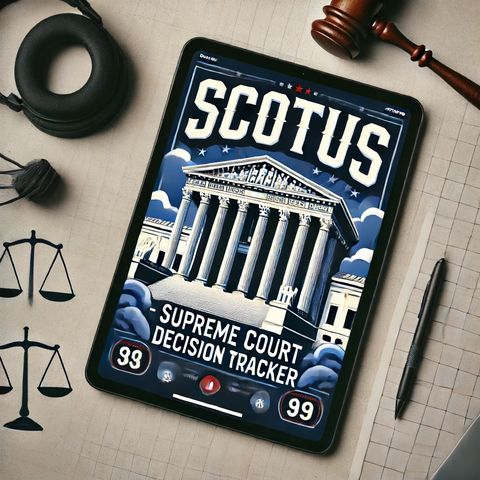Supreme Court Rulings Shape Societal Norms: Navigating Racial Bias, LGBTI Rights, and Gun Control
Jun 19, 2024 ·
2m 59s

Download and listen anywhere
Download your favorite episodes and enjoy them, wherever you are! Sign up or log in now to access offline listening.
Description
The workings of the judiciary, especially at the highest levels, play a crucial role in interpreting laws and setting precedents that affect the everyday lives of citizens. This is vividly...
show more
The workings of the judiciary, especially at the highest levels, play a crucial role in interpreting laws and setting precedents that affect the everyday lives of citizens. This is vividly illustrated in recent decisions by Supreme Courts in the United States and abroad, touching on deeply contentious issues such as racial bias in jury selection, LGBTI rights, and gun control regulations. Each case sheds light on how legal interpretations can diverge significantly based on regional judicial philosophies and societal norms.
In a notable decision by the California Supreme Court, the complex issue of racial bias in jury selection was brought to the forefront. The court upheld the death penalty conviction of a white defendant, rejecting the claim that prosecutors had improperly excluded Black women from the jury. This decision prompts a closer examination of the criteria used in determining racial bias and the judicial benchmarks for establishing whether such biases impact the fairness of trials. Critics argue that this decision might set a concerning precedent that overlooks subtle prejudices, potentially affecting the representation of minorities in the judicial process.
Meanwhile, in Namibia, the approach to human rights, specifically the rights of LGBTI persons, is under scrutiny as the nation anticipates a significant High Court verdict regarding the criminalization of sodomy. This forthcoming decision is crucial, not only in terms of decriminalizing private consensual acts but also in how it addresses broader societal attitudes toward LGBTI individuals. The safety and social acceptance of LGBTI people in Namibia hinge significantly on this legal determination, reflecting a pivotal moment in the intersection of law, social policy, and human rights within the region.
Turning attention back to the U.S., the Supreme Court's decision to allow bump stocks — accessories that enable semi-automatic rifles to fire more rapidly — showcases another contentious aspect of law: gun control. Following this verdict, the U.S. Senate's rejection of a bill to ban bump stocks further highlights the deep divisions within American politics on how best to interpret the Second Amendment. Proponents of the bill argue that it is essential for public safety, while opponents see it as an overreach that could infringe upon constitutional rights.
These cases from different jurisdictions illustrate the ongoing challenges and responsibilities that Supreme Courts bear in shaping legal and social landscapes. They underline the importance of judiciary decisions that not only interpret existing laws but also respond to evolving societal values and ethical considerations. Furthermore, they emphasize the need for judiciaries to balance respect for rights and freedoms with public safety and social welfare, a task that remains as complex as it is vital.
show less
In a notable decision by the California Supreme Court, the complex issue of racial bias in jury selection was brought to the forefront. The court upheld the death penalty conviction of a white defendant, rejecting the claim that prosecutors had improperly excluded Black women from the jury. This decision prompts a closer examination of the criteria used in determining racial bias and the judicial benchmarks for establishing whether such biases impact the fairness of trials. Critics argue that this decision might set a concerning precedent that overlooks subtle prejudices, potentially affecting the representation of minorities in the judicial process.
Meanwhile, in Namibia, the approach to human rights, specifically the rights of LGBTI persons, is under scrutiny as the nation anticipates a significant High Court verdict regarding the criminalization of sodomy. This forthcoming decision is crucial, not only in terms of decriminalizing private consensual acts but also in how it addresses broader societal attitudes toward LGBTI individuals. The safety and social acceptance of LGBTI people in Namibia hinge significantly on this legal determination, reflecting a pivotal moment in the intersection of law, social policy, and human rights within the region.
Turning attention back to the U.S., the Supreme Court's decision to allow bump stocks — accessories that enable semi-automatic rifles to fire more rapidly — showcases another contentious aspect of law: gun control. Following this verdict, the U.S. Senate's rejection of a bill to ban bump stocks further highlights the deep divisions within American politics on how best to interpret the Second Amendment. Proponents of the bill argue that it is essential for public safety, while opponents see it as an overreach that could infringe upon constitutional rights.
These cases from different jurisdictions illustrate the ongoing challenges and responsibilities that Supreme Courts bear in shaping legal and social landscapes. They underline the importance of judiciary decisions that not only interpret existing laws but also respond to evolving societal values and ethical considerations. Furthermore, they emphasize the need for judiciaries to balance respect for rights and freedoms with public safety and social welfare, a task that remains as complex as it is vital.
Information
| Author | QP-4 |
| Website | - |
| Tags |
Copyright 2024 - Spreaker Inc. an iHeartMedia Company
